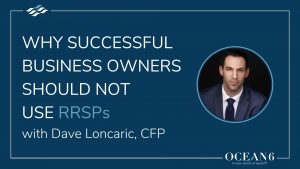In 2019, Canada’s revised corporate passive income tax rules were implemented. Since then, business owners have been finding themselves increasingly frustrated with the confusing and convoluted nature of these rules. Unfortunately, this also means many business owners we meet are not investing properly and are paying too much tax. At the same time, they’re also unclear on which investments are best to hold inside their corp.
If that’s you, you are in the right place.
Today, we’ve compiled four of our top tips for decreasing taxes on passively generated income. But before we get to those tips, let’s start with the basics.
What is Passive Income Tax?
This refers to any income you earn inside your corp, outside of the income you earn from business activity.
For example, for a company selling COVID masks, active income is any income they earn by selling those masks. All other income earned is considered passive. This includes income made on investments, real estate, and more.
Now, let’s look at an example of how passively generated income can result in paying too much tax.
Watch the video on this strategy
Passive Income Tax and the Small Business Deduction
The Small Business Deduction, “reduces the corporate income tax that a corporation would otherwise have to pay in a taxation year throughout which it was a Canadian-controlled private corporation (CCPC).”
As the Government of Canada continues to outline,
“A corporation’s SBD for a taxation year is generally calculated by multiplying its SBD rate by the lesser of its:
- income for the year from an active business carried on in Canada, excluding certain income and exceeding certain losses;
- taxable income for the year; and
- business limit for the year.”
From 2009 on, the business limit has been $500,000. But with the changes we saw in 2019, new rules for passive investment income have affected how much of a CCPC’s active business income is eligible for the SBD.
Consider this, now for every passive dollar earned above $50,000 a year, you lose $5 of your small business deduction.
That’s the equivalent of paying an additional 80% tax. Yes—you read that right, 80%!
It’s no wonder so many business owners have a newfound focus on saving on passive income tax. The good news is, we’ve got four helpful tips for doing just that.
Decrease Taxes on Passively Generated Income
Here are four tips to help decrease taxes on passively generated income.
Utilize your capital gains investments
Capital gains investments, including stocks, real estate, and corporate class mutual funds, are taxed at a much more favorable rate than dividend or interest income.
Read about four other ways to use your corporation to invest and save taxes in this post.
Invest in corporate class funds
Corporate class funds (those held inside a mutual fund corporation) are an incredibly tax-efficient option that also happens to be one of the most common choices for building your investment portfolio.
Look into corporately owned overfunded life insurance
In many cases, paying more into a life insurance policy than what it requires helps you accumulate cash and save on passive income tax. Done strategically, this comes with a number of benefits, including asset protection, tax-free withdrawals, flexible investment options, and more.
While we’re on the subject, read more about the two primary situations when life insurance is a powerful tax-efficient investment tool by clicking here.
Utilize your capital dividend account and check to see if you have a balance
A capital dividend account is a notional account–this means you don’t see it unless it has a balance. It allows for the tax-free flow-through of life insurance and capital gains.
If you have yet to create a capital dividend account for your corporation, you are missing out on one of the best-kept secrets of successful business owners and entrepreneurs.
Click here to watch a two-minute video on Why You Should Have A Capital Dividend Account In Your Corporation.
Are You Paying Too Much Passive Income Tax?
These passive income rules have meant more challenges and confusion for corporations over the past few years. But with the right help and strategy, effectively navigating these rules and saving money on passive income tax simultaneously is possible.
And we can help.
Ocean 6 is here to build an innovative financial plan, The Blueprint, that will ensure your dollars are working for you in all the right places and make sure your corporation is as tax-efficient as possible.
If you’re excited about your financial future but don’t have a plan, contacting us is the first step on one of the most important decisions you will make for your business.
Click here to schedule a call and get started.
Did you learn a lot about passive income from this post? Try these posts next:












